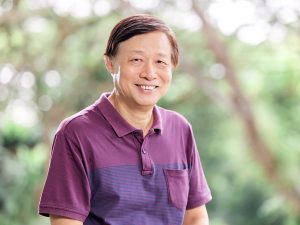Honorary Fellowship for Albert Tsui

We are delighted to announce that one of the longest-serving members of the Economics Department, Albert Tsui Ka Cheng, will be conferred an Honorary Fellowship by the University upon his retirement at the end of this month. Professor Tsui grew up in Hong Kong and completed his undergraduate studies there. Soon after earning his doctorate in the United States in 1989, he joined the NUS Economics Department, and this has been his academic home for the last 30 years. Even in retirement, Professor Tsui will continue to do some teaching for the Department; he will continue to teach a popular advanced undergraduate course on financial economics which he has taught for many years.
Professor Tsui is an expert on the econometric modelling of financial markets. In particular, he and his co-author Tse Yiu Kuen, have done influential work on multivariate extensions of the generalized autoregressive conditional heteroskedasticity or GARCH model. The GARCH model is one of the standard ways of modeling time series of financial data (such as stock returns). This econometric model allows for the conditional variance of the error term to be time varying, even if the unconditional variance of the error term is constant. This feature allows the model to explain changes in the variance over time and to estimate the parameters of conditional variance jointly with the parameters of the conditional mean.
Together with his Department colleague, Chia Ngee Choon, Professor Tsui has also carried out research on the economics of pensions and healthcare in Singapore. A few years ago, they completed an assessment of the retirement adequacy of the Central Provident Fund, after taking into account the prevalence of home ownership, itself a feature of the connection between housing and pensions policies in Singapore.
We wish Albert a happy and healthy retirement!
 Albert Tsui in his own words... Albert Tsui in his own words...
Tell us about your early life. I was born and grew up in Hong Kong, in a small village, with my parents, two elder sisters, and a brother. Both of my parents worked, so I was quite independent, which turned out to be very fortunate. Among my siblings, only I had the opportunity to go to a public school far away from home. During those long bus rides, I learned the joy of reading, and also became interested in watching movies, which made me think that one day I would become a movie director! As a child, I used my limited time and money in watching movies, all kinds of movies, so budgeting and planning my schedule was important. I had no friends with similar interests, so I was often on my own. When did you first think of becoming an economist? My first choice at university was not economics. It was mathematics and physics and I studied these subjects as a freshman. But somehow I did not want to continue with physics, so I changed my major to economics. I still like mathematics, but I shifted more to the mathematical application side, which is economics. Then I graduated and became a civil servant in order to financially support my family. I worked for seven years, and then returned to the academic world as I always wanted to be a researcher. I went to the US to study econometrics and after graduation, I moved over to Singapore, together with my family and my mother, when she was 78. My mother studied English for about 4 years in order to communicate with my daughter and our housemaid, and she succeeded! What aspects of your life as an academic economist do you like most? I like teaching and research. Particularly student supervision is one of the most rewarding aspects of my role as an academic. I recall that one student approached me to be his Honours' and Masters' thesis supervisor. He worked very hard and published several papers. Finally, he was offered graduate fellowships by several good universities in the USA and UK. What aspects do you like least? Well, I feel unhappy when I receive reports from referees that beat around the bush. Likewise, I usually ignore negative student feedback with unsubstantiated comments. Lecturers should not entertain unreasonable requests from students, such as watering down the core content of a course. Usually I give graded answer scripts back to students. Several years ago one student who took the mid-term exam of my module came to my office to complain that I mis-marked the algebraic derivation of certain results, which he wrote in pencil. I said fine and invited him to re-derive the results on the spot. His face turned pale and admitted that he didn't really know how to answer the question. How does NUS today compare with NUS when you first joined in 1989? What has improved and what has gone worse? My batch in 1989 consisted of four or five colleagues and we all got tenure and promotion. If I remember correctly, our teaching loads were double or even triple of what it is now. Under strong leadership, the international ranking of the department has continued to improve. There are ample research funding and collaboration opportunities. One drawback may be that collegial relationships have become relatively more alienated. What are your plans for retirement? I played the violin while I was in high school, but never got a chance to play the saxophone. The best time to start is now. I plan to take lessons. Definitely, it will be wonderful if I can handle Baby Elephant Walk or Pachelbel’s Canon in D. In addition, I shall pick up cooking. Actually, I cooked simple meals when I was on short-term research visits. Since the Covid-19 pandemic, I worked from home, and gradually picked up more cooking by watching videos on YouTube. Why not make it a hobby, right? |
JQ, June 23, 2021

